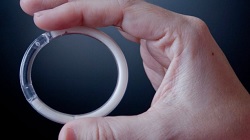 |
| Example of an intravaginal ring--Courtesy of Northwestern University |
Bolstering recent growth in the research of progesterone-loaded intravaginal rings as contraceptives, the World Health Organization has voiced its approval, adding the delivery method to its 2015 essential medicines list, particularly for postpartum women and with a focus on the developing world.
According to the WHO and UNICEF, in a report at ScienceCodex, women who have recently stopped breastfeeding are at risk of pregnancy within a short interval of the one before, putting the woman, the baby and its siblings at risk. The Population Council, an organization focusing on reproductive health around the world, developed the low-dose progesterone CVR as a contraceptive option for as early as four weeks after a woman has given birth. And it can be used for up to a year to help women plan their pregnancies more effectively.
Unlike oral contraceptives that include estrogen, the newly lauded contraceptive doesn't affect a woman's ability to produce breast milk. It has shown to be 98.5% effective and safe for both the mother and child.
The ring has been approved in Latin America exclusively at the moment: Bolivia, Chile, Dominican Republic, Ecuador, El Salvador, Guatemala, Panama and Peru have green-lighted the three-month version. The Population Council is also looking to introduce the ring in the African countries of Kenya, Nigeria and Senegal and are expecting results soon from a clinical study in India.
"More than 220 million women in the developing world want to prevent pregnancy but are not using modern contraception," Senegal's Ministry of Health and Social Action Director Dr. Bocar Mamadou Daff said in a statement. "Vaginal rings like the progesterone CVR represent an important advance in contraceptive development. The inclusion of the progesterone CVR on the WHO's essential medicines list will provide a new option to address unmet need among new mothers, allow women to safely space their pregnancies, and improve the health of women and children--in Senegal and around the world."
Researchers are looking to make intravaginal contraceptive rings available in the U.S., and Boston's Columbia Labs ($CBRX) earlier this year acquired the license to a ring designed to deliver several different drugs at a time. With the WHO on board with the Population Council's version, this technology can begin to take hold worldwide.
"Inclusion of the progesterone CVR on the essential medicines list is good news for women," the Population Council's Régine Sitruk-Ware told ScienceCodex. "It is an important step in making the ring more widely available to the 70% of women in the first postpartum year who want to breastfeed for a long time and do not want to get pregnant but are not using contraception."
- here's the ScienceCodex story